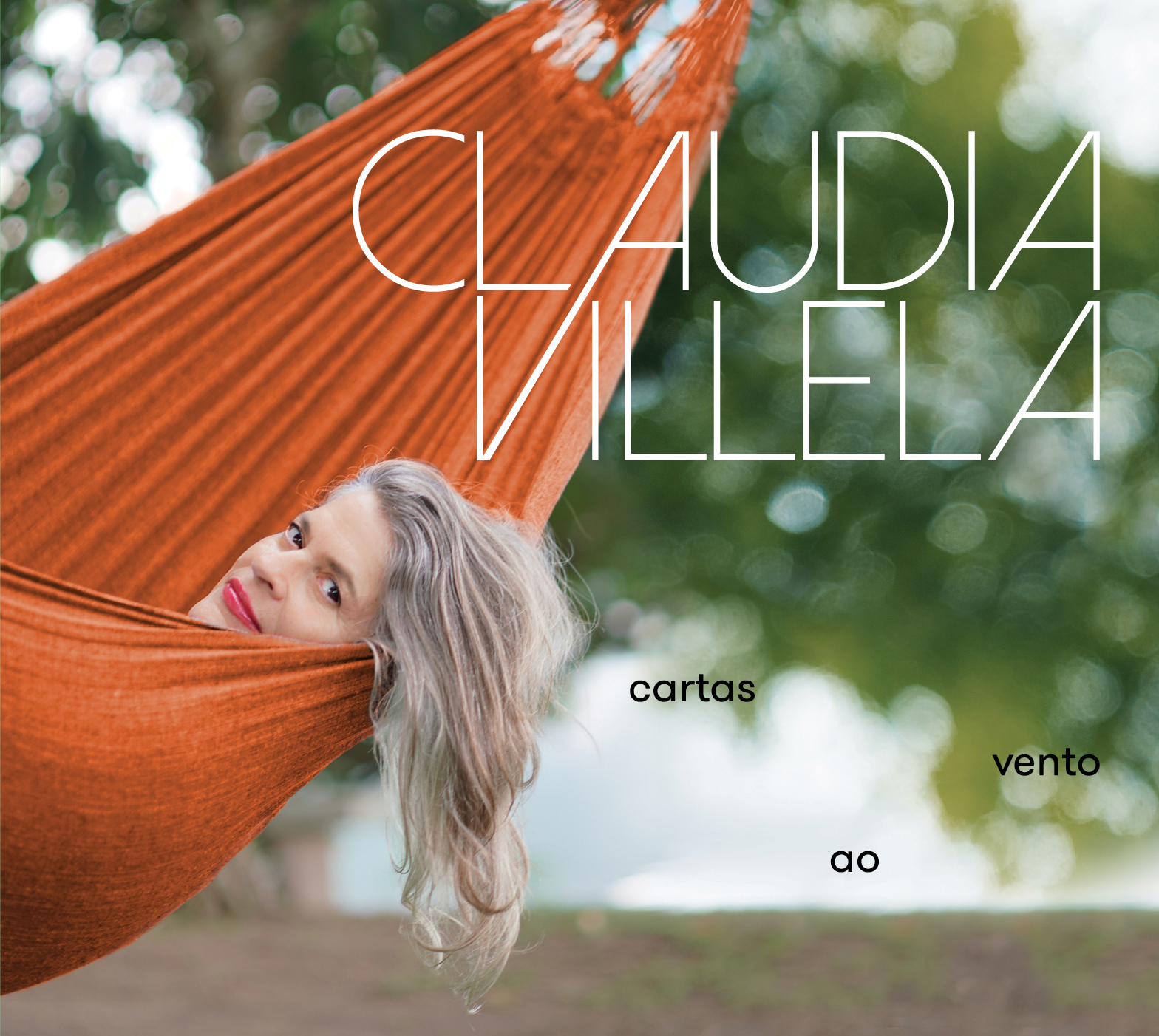Claudia Villela: Cartas ao Vento
8th September 2023

The brilliant Rio-born vocalist/pianist/composer, long based in Santa Cruz, California, follows up her 2019 release "Encantada (Live)" with her first made-in-Brazil recording, featuring a host of her favorite musical friends: Jorge Helder, b; Mario Adnet, g/arr; Marcelo Costa, d; Vitor Goncalves, acc; Toninho Horta, g; Romero Lubambo, g; Ze Nogueira, sax; et al. "This is not a 'jazz' album," says Claudia. "It's not about theme and improvisation. I wanted everything to be part of the song ...."
More than a musical homecoming, Cartas ao Vento is a fervid embrace, a joyous celebration marking Claudia Villela’s return to Rio de Janeiro for her first recording in Brazil. Since the mid-1980s the vocalist, pianist, percussionist, and composer has thrived in the San Francisco Bay Area, where her extraordinary voice and capacious improvisational skills have earned an avid following amongst American and Brazilian jazz’s greatest figures. Cartas ao Vento (“Letters to the Wind”) was an indirect result of the pandemic, when Villela was in Rio for a couple of weeks visiting family. Handed a basket of limes, she turned the tart and bitter fruit into an intoxicating pitcher of caipirinhas.
Villela’s small but precious discography includes albums with Toots Thielemans, Kenny Werner, and Michael Brecker. Amongst Brazilian masters she’s collaborated with Toninho Horta, Romero Lubambo, Guinga, Airto, and Dori Caymmi. Hermeto Pascoal recently hailed her from the stage of the SFJAZZ Center as a singularly adventurous artist. Cartas ao Vento illustrates that praise,bringing her together with some of her earliest musical comrades, including bassist Jorge Helder, an esteemed accompanist who works with legendary artists like Maria Bethânia and Chico Buarque, and drummer Marcelo Costa, who also performs widely with Maria Bethânia, among others.
Another friend from high school days, Mario Adnet, contributed several charts for flutes, saxophones, and strings (“His sisters are dear friends and I was always at their house, going to the beach, sleeping over, going to parties, listening to records,” Villela recalls). And another heavyweight, Edu Neves, contributes on saxophones and flutes, less as a soloist than as an integral part of Villela’s exquisitely crafted musical settings. Rather than writing tunes to stretch out as an improviser, she designed the project to focus on her work as a composer and arranger. “This is not a ‘jazz’ album,” she says. “It’s not about theme and improvisation. I wanted everything to be part of the song, to get away from the solo as a virtuoso statement.”
Yet there’s virtuosity aplenty, starting with the opener “Cartas ao Vento,” which launches the album with an ebullient blast of joy powered by Villela’s deft pandeiro work propelling her poetic, sensory-laden description of her homecoming. In many ways the title track embodies several themes running through the album, with her Brazilian team joined by U.S.-based collaborators, including bassist Gary Brown and fellow Brazilians Vitor Gonçalves on accordion and Celso Alberti on surdo and percussion.
She’s at her most freewheeling on “Agua Santa,” a multipart excursion that features her impressive accompaniment on piano. With Lubambo’s gorgeous guitar work, the piece is a hat tip to the great composer/guitarist Guinga, centering on an unaccompanied vocal passage echoing the anthem of the sertão, “Asa Branca.” She composed the dreamy ballad “Meninando” with Toninho Horta in mind, and in a match made in guitarra heaven, Horta is joined by Lubambo.
The Minas Gerais thread continues with “Chamego,” a breathtaking Villela original that feels like it could have come from a third volume of Milton Nascimento’s Clube da Esquina. Featuring her piano, the superlative rhythm section tandem of Helder and Costa, and Adnet’s string arrangement, Villela evokes the lush countryside with an incantatory melody echoing the flow of the hills.
Another thread running through the album is Villela’s gift for setting poetry to music. She wrote three of the Cartas ao Vento pieces as part of a commissioning project to compose music for Latin American poets. “Flores do Mais” is a captivating setting for verse by the great, doomed Brazilian poet Ana Cristina Cesar that features Villela’s piano with Helder and Costa and Adnet’s lithe horn arrangement featuring the great Rio saxophonist Zé Nogueira. Nogueira is also featured prominently on “Instrumento,” providing a beautifully buzzy but unsettling sonic scrim on the double-reed duduk in the midst of Villela’s setting for lyrics by the late Rio de Janeiro poet Mario Quintana; Claudia created the vocal arrangement on the spot. And “Paramo,” sung in Spanish, is a ravishing setting for a poem by the late Venezuelan writer Ramon Palomares. Adnet’s arrangement for Everson Moraes’s smoothly regal trombone highlights a line Palomares could have written about Villela herself: “when you’re singing everything moves.”
Not that Villela needs lyrics to make a brilliant impression. On “Chorinho pra Elas,” in the studio, she crafted a lapidary chart that includes her two daughters, granddaughter, mother, and godmother. Edu Neves’s flute shadows their soaring vocals, a blend that adds a luminous sheen to the bountiful love spilling out from the dancing melody. Dedicated to Chico Buarque, “Bolero” offers a very different wordless soundscape with a confidently climbing line that ascends to glory (accompanied by the Everson Moraes’s work on vintage brass ophicleides). The album closes with “Batucador,” an ecstatic blast of frevo dedicated to percussion legend Airto that centers on the wordless interactions between Villela and Gonçalves’s accordion. Building to a burst of energy, the track embodies the creative vitality of an artist whose roots in her homeland have grown deeper the longer she’s away.